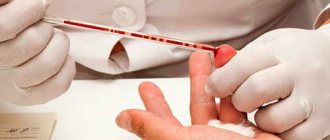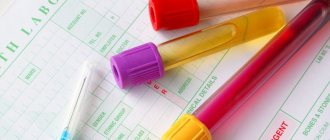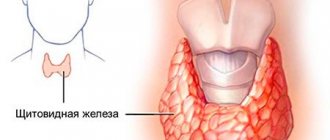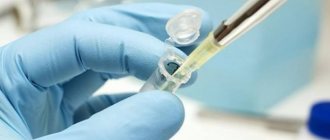When is a blood test for hormones prescribed?
Hormonal analysis is usually carried out if there is a suspicion of dysfunction of the endocrine glands or if an increase in the size of the glands is detected.
Indications for testing for female sex hormones (estrogens)
are:
- menstrual irregularities;
- infertility;
- miscarriage;
- acne;
- overweight;
- fibrocystic mastopathy (breast disease).
Indications for testing for male sex hormones (androgens)
are:
- suspicion of the development of tumor processes;
- ovarian dysfunction;
- kidney dysfunction;
- overweight (obesity);
- infertility;
- acne;
- in women – excessive growth of body hair.
Hormonal analysis is prescribed during pregnancy if pathological development of the fetus is suspected. An analysis for the hormone hCG (human chorionic gonadotropin), produced by the cells of the membrane of the embryo, can detect pregnancy already on the 6-10th day after fertilization.
Interpretations of TSH, T3 and T4
By comparing TSH with T4 values, the doctor describes the nature of the thyroid problem. For example:
- A normal TSH and normal T4 indicate a normally functioning thyroid gland.
- Low TSH levels and high T4 levels usually indicate hyperthyroidism.
- High TSH and low T4 indicate primary hypothyroidism (due to thyroid disease).
- Low TSH levels and low T4 levels indicate secondary hypothyroidism (caused by disease of the pituitary gland or cerebral hypothalamus).
For diagnostic purposes, a low T3 level along with a high TSH level is considered evidence of hypothyroidism. On the contrary, a low TSH value with a high T3 value is considered evidence of hyperthyroidism.
Blood test for hormones when planning pregnancy
It is very important to take a blood test for hormones when planning a pregnancy. Timely assessment of hormonal levels will help avoid possible problems.
The main hormones that are checked when planning pregnancy:
- FSH (follicle-stimulating hormone)
- in women, is responsible for the growth of the egg (follicle) in the ovary. In men, it is one of the main sex hormones that regulate reproductive function. - LH (luteinizing hormone)
- in women, ensures completion of the maturation of the egg in the follicle and subsequent ovulation (rupture of the follicle and release of the egg). In men, it affects the maturation of sperm. - Prolactin
– stimulates lactation after childbirth. During pregnancy, it reduces the release of FSH. If there is no pregnancy, an increased amount of prolactin can lead to a pathological deficiency of FSH and prevent conception. - Estradiol
- affects all female genital organs. - Progesterone (pregnancy hormone)
is produced after the egg matures. Without this hormone, a fertilized egg cannot attach to the uterus. Lack of progesterone can cause miscarriage. - Testosterone
is a male sex hormone; an increased amount of testosterone in women can lead to miscarriage, and a decreased amount in men can lead to decreased sperm quality. - DEA sulfate
(DEA-s or DEAS) is produced in small quantities in the body of women. Increased concentrations of this hormone can lead to infertility. - Thyroid hormones.
Thyroid dysfunction can also cause infertility.
Tg/tiroglobulins
Thyroglobulin (TG) is a protein produced by the thyroid gland. Its presence in the blood is a sign that the patient still has a thyroid artery, whether the entire gland or remnants remain after surgery or radioactive ablation (RAI).
Thyroglobulin is primarily tested in patients with thyroid cancer to determine whether cancer tissue produces thyroglobulin before treatment, to determine whether treatment is being given, and to help detect recurrence after treatment. Because the most well-known types of thyroid cancer, namely papillary and follicular thyroglobulin, as well as elevated thyroglobulin levels can be a sign of cancer recurrence.
Reference range: if there is no thyroid gland, it should be less than 0.1 ng/ml. If there is still iron present, it should be less than or equal to 33 ng/ml.
Low levels of thyroglobulin are normal for people without thyroid disease. In patients with thyroid cancer, this means that thyroglobulin levels can be monitored later to detect recurrence.
Thyroglobulin levels after thyroid surgery or radioactive iodine (RAI) therapy are 0 or very low. If levels begin to rise after treatment for thyroid cancer, it may be a sign that the cancer has returned.
Conditions that cause inflammation of the thyroid gland, such as goiter, thyroiditis, or hyperthyroidism, can also cause thyroglobulin levels to increase. However, during treatment, these conditions are usually not imposed during the test.
How to donate blood for hormones. Interpretation of analysis results.
Blood from a vein is used to test hormones.
Depending on the clinical signs indicating a specific pathology, an analysis with tests for specific hormones is usually prescribed.
The most complete picture of your health can be obtained by taking a test for the following hormones.
Thyroid hormones:
- T3 (triiodothyronine)
free – stimulates oxygen metabolism in tissues. Normal values: 2.6 - 5.7 pmol/l. - T4 (thyroxine)
– stimulates protein synthesis. Normal values: 0.7-1.48 ng/dl. - Antibodies to thyroglobulin (AT-TG)
are an important parameter for identifying a number of autoimmune diseases. Normal values: 0-4.11 U/ml. - Some others
.
Pituitary hormones:
- TSH (thyroid-stimulating hormone)
– stimulates the production of thyroid hormones (T3 and T4). Normal values: 0.4-4.0 mU/l. An elevated TSH value usually indicates decreased thyroid function. - FSH (follicle stimulating hormone)
. Normal values: in women - depends on the phase of the menstrual cycle. Phase I – 3.35-21.63 mU/ml; Phase II – 1.11-13.99 mU/ml; postmenopause – 2.58-150.53 mU/ml; girls under 9 years old 0.2-4.2 mU/ml. In men – 1.37-13.58 mU/ml. - LH (luteinizing hormone)
. Normal values: in women - depends on the phase of the menstrual cycle. Phase I – 2.57-26.53 mU/ml; Phase II – 0.67-23.57 mU/ml; postmenopause – 11.3-40 mU/ml; girls under 9 years old - 0.03-3.9 mU/ml. In men – 1.26-10.05 mU/ml. - Prolactin
.
The main function is to stimulate the development of mammary glands and lactation. Normal values: in women (from the first menstruation to menopause) – 1.2-29.93 ng/ml; in men – 2.58-18.12 ng/ml. Increased concentrations of prolactin are called hyperprolactinemia
. There are physiological and pathological hyperprolactinemia. Physiological hyperprolactinemia can be caused by breastfeeding, pregnancy, severe physical activity, and stress. An increased concentration of prolactin in women leads to menstrual irregularities and may cause infertility. In men, hyperprolactinemia leads to decreased libido and impotence. - ACTH (adrenocorticotropic hormone)
– stimulates the synthesis and secretion of hormones from the adrenal cortex. Normal values: 9-52 pg/ml. - Some others
.
Sex hormones:
- Testosterone
(male sex hormone) is produced by the adrenal glands and in the gonads (in men - in the testicles, in women - in the ovaries). Affects the development of the genital organs, the formation of secondary sexual characteristics, the growth of bones and muscles. Normal values: for men - 4.94-32.01 nmol/l, for women - 0.38-1.97 nmol/l. - Estrogens
(female sex hormones). The main estrogens - progesterone and estradiol - are produced by the adrenal glands and ovaries. Normal values of progesterone in women depend on the phase of the menstrual cycle: Phase I – 1.0-2.2 nM/l; Phase II - 23.0-30.0 nM/l; for postmenopause – 1.0-1.8 nM/l. Similarly for estradiol: phase I - 198-284 pM/l: phase II - 439-570 pM/l; for postmenopause – 51-133 pM/l. Elevated estrogen levels may indicate tumors of the ovaries and adrenal cortex, as well as cirrhosis of the liver. Reduced - for insufficient development and sclerosis of the ovaries.
Adrenal hormones:
- DEA-s (dehydroepiandrosterone sulfate)
is necessary for the synthesis of testosterone and estrogens. The normal range for the concentration of this hormone is: 3591-11907 nmol/l; in women – 810-8991 nmol/l. However, this is the general picture; when processing analysis data, the patient’s age must also be taken into account. - Cortisol
is involved in many metabolic processes and is actively produced as a result of the body’s response to hunger or stress. Normal values: for children under 16 years of age - 3-21 mcg/dl, for an adult - 3.7-19.4 mcg/dl. - Aldosterone
is responsible for regulating water-salt balance in the body. Normal values: 35 - 350 pg/ml.
RT3/reverse T3/reverse triiodothyronine
Reverse T3 is an inactive form of T3 produced in large quantities during stress.
Reference range: typically 10-24 ng/dL
This test is rarely prescribed by doctors, as they do not see the point in this measurement.
A group of doctors dedicated to optimal hormone balance believe that increased RT3 imbalance is the main sign of an underactive or dysfunctional thyroid gland. They believe that in the opposite direction, T3 should be reduced to the lower end of the normal range.
Preparing for a hormone test
The amount of hormones in the blood depends on the time of day, since there is a daily rhythm of secretion (release of hormones). Blood for hormonal analysis should be taken in the morning, on an empty stomach.
In women, hormonal levels also depend on the stage of the menstrual cycle. The most favorable days for analysis are days 5-7 of the cycle, starting from the first day of menstruation.
On the eve of the test, you should not drink alcohol, and you should also avoid increased physical activity and stressful situations. It is advisable not to smoke for an hour before the test.
A week before the test, you must stop taking hormonal medications. If you are prescribed medication, discuss this with your doctor; the test may have to be postponed.
Ultrasound of the thyroid gland - all about the most important procedure
Published: 02/28/2017
Ultrasound of the thyroid gland - (Thyroid Ultraschall) is the simplest and most highly informative diagnostic method, which provides a detailed assessment of the condition of the gland itself, as well as the anatomical formations adjacent to it - vessels and muscles. This is possible using modern ultrasonic sensors with additional capabilities. In particular, Doppler ultrasound allows you to examine the blood supply to the thyroid gland and nearby lymph nodes. Share link:
Gynecologist appointment
Published: 01/02/2017
Gynecology is a field of medicine that studies the sexual and reproductive health of the fair sex, and also helps women during pregnancy and childbirth. An appointment with a gynecologist is an obligatory part of every woman’s life.








